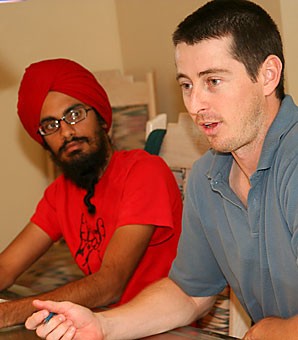The UA will be sending a delegation of faculty and students to the Arizona Focus the Nation Summit on Friday to coordinate content for content related to a national global warming teach-in symposium.
The summit, which will be held at Gateway Community College in Phoenix, will bring together students and faculty from across the state to plan for a national symposium to be held Jan. 31.
At the summit, participants can learn about incorporating global warming and climate change issues into their classrooms, said Vincent Pawlowski, a coordinator for the UA’s Focus the Nation efforts.
“”What we’re trying to do is reach educators to pass it on through their students,”” he said.
The size of the UA’s delegation is not known right now, as registration is still open, he said.
Focus the Nation is a national group that seeks to educate young people, particularly university students, about global warming, said Garett Brennan, director of media relations for Focus the Nation.
Students can speak with politicians and civic leaders about the issue, bringing global warming to the forefront of political issues in elections, Brennan said.
“”The idea is (to) get educated on the issue, figure out what’s going on, then vote on what you think the top solutions are,”” he said.
Statewide planning done at the summit will culminate in a national teach-in event on Jan. 31.
Already, 750 schools have signed on to be a part of the teach-in, Brennan said.
All three major Arizona universities – the UA, Arizona State University and Northern Arizona University – as well as several community colleges will be participating.
Dire predictions have been made about the consequences of global warming, one being the possible extinction of polar bears by the end of the century due to rising sea levels.
The Center for Biological Diversity, which has offices in Tucson, has spearheaded the effort to bring awareness to the prediction that polar bears will face drastically reduced populations in the coming decades, said Will Hodges, a biodiversity advocate for the center.
“”Our take on this is that it’s a call to action to drastically reduce greenhouse gas emissions,”” Hodges said.
Colleges and universities around the nation are important figures in the dialogue about global warming solutions, Brennan said.
“”The people that are going to be dealing with this issue in about 20 to 50 years are all the people who are in college right now and younger than them,”” Brennan said. “”So if we can make sure that this generation is educated on what task they have in front of them, then we’re setting ourselves up for a better situation in 20 to 30 years.””









